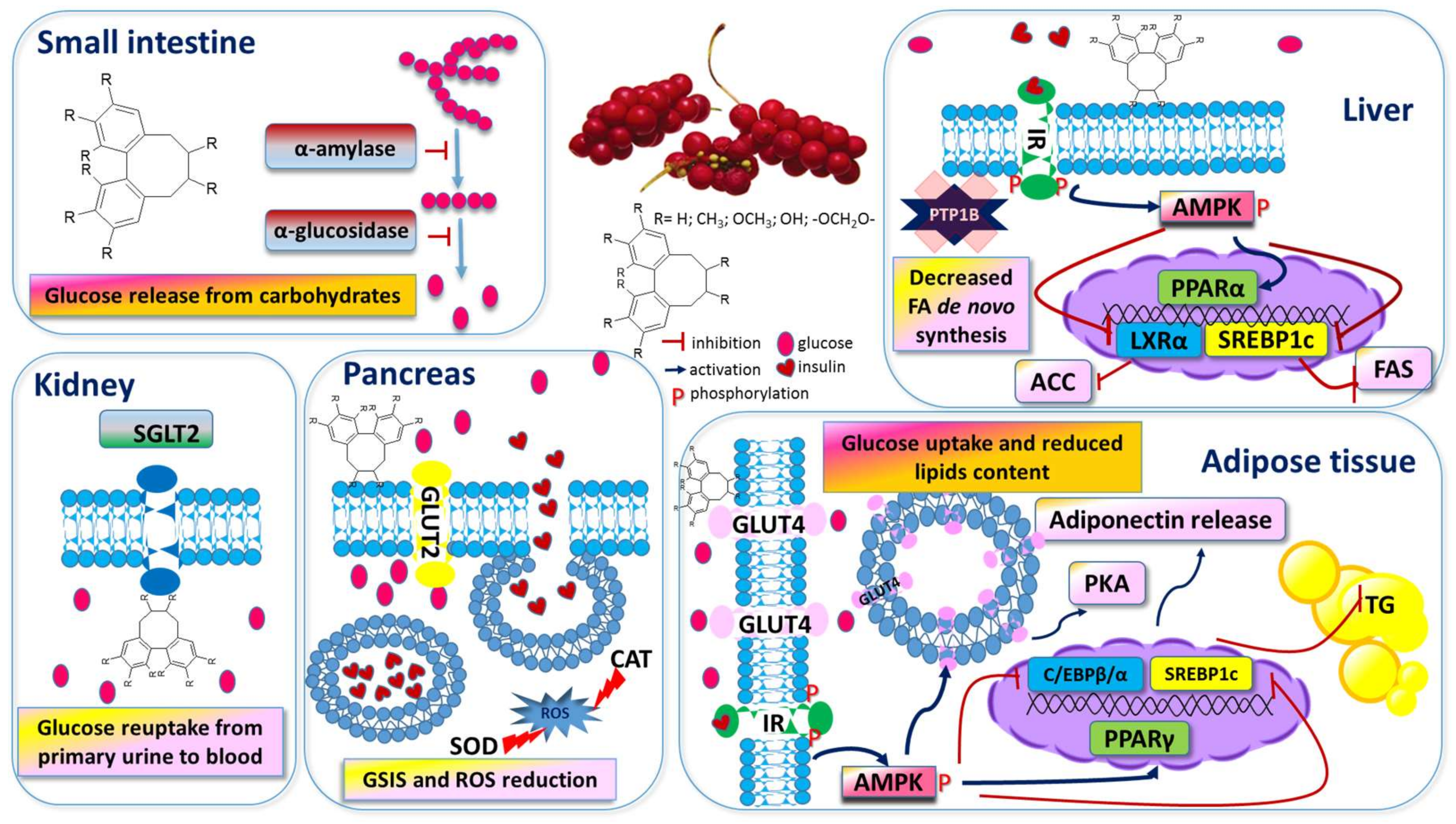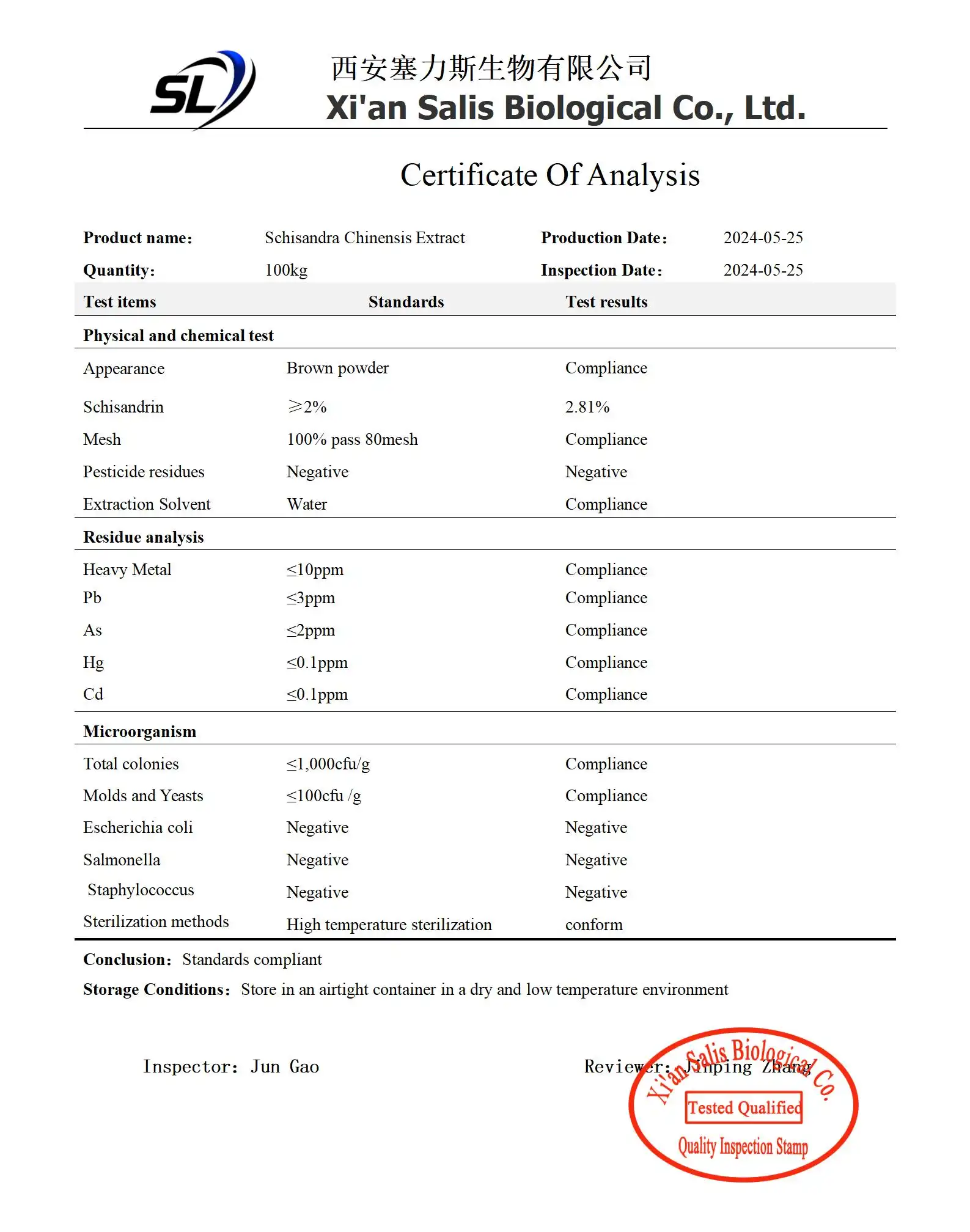Schisandrin, a bioactive compound found in the fruit of Schisandra chinensis, has garnered significant attention in recent years due to its potential health benefits. This blog post aims to provide a comprehensive overview of it, exploring its properties, potential applications, and the current state of research surrounding this fascinating compound. We'll delve into the various ways it may impact human health and examine the scientific evidence supporting its use in different contexts.

What are the main health benefits of Schisandrin?
Antioxidant Properties
Schisandrin has demonstrated potent antioxidant parcels in multitudinous studies. As an antioxidant, it helps cover cells from oxidative stress caused by free revolutionaries. This defensive effect may contribute to its eventuality in precluding colorful habitual conditions and supporting overall health. Research has shown that it can increase the exertion of antioxidant enzymes similar as superoxide dismutase and catalase, farther enhancing its capability to combat oxidative damage. The antioxidant parcels of it may also play a part in its implicitanti-aging goods, as oxidative stress is a crucial factor in the aging process.
Liver Protection
One of the most well- studied benefits of schisandrin is its hepatoprotective goods. It has been shown to cover liver cells from damage caused by colorful poisons and environmental stressors. It may help ameliorate liver function by promoting the rejuvenescence of liver cells and reducing inflammation in the liver. Studies have demonstrated that it can increase the situations of glutathione, an important antioxidant in the liver, which helps detoxify dangerous substances. also, it may help regulate liver enzymes, potentially perfecting overall liver health and function.
Neuroprotective Effects
Arising exploration suggests that schisandrin may have neuroprotective parcels, potentially serving brain health and cognitive function. Studies have shown that it can help cover neurons from damage caused by oxidative stress and inflammation. This neuroprotective effect may have counteraccusations for colorful neurological conditions, including neurodegenerative conditions. Some exploration has also indicated that it may ameliorate memory and literacy capacities, although further studies are demanded to confirm these goods in humans. The implicit neuroprotective parcels of it make it an interesting emulsion for farther disquisition in the field of neuroscience.
How does Schisandrin affect the immune system?
Immunomodulatory Properties
Schisandrin has been found to possess immunomodulatory properties, meaning it can help regulate and balance the immune system. This compound may enhance the body's natural defense mechanisms, potentially improving overall immune function. Studies have shown that it can stimulate the production of certain immune cells, such as natural killer cells and T lymphocytes, which play crucial roles in defending the body against pathogens and abnormal cells. Additionally, it may help modulate the production of cytokines, signaling molecules that are essential for coordinating immune responses.
Anti-inflammatory Effects
Another important aspect of schisandrin's impact on the immune system is its anti-inflammatory properties. Chronic inflammation is associated with numerous health problems, and compounds that can help reduce inflammation are of great interest in medical research. It has been shown to inhibit the production of pro-inflammatory molecules and reduce the activation of inflammatory signaling pathways. This anti-inflammatory effect may contribute to its potential benefits in various conditions, including autoimmune disorders and chronic inflammatory diseases. By helping to regulate the inflammatory response, schisandrin may support overall immune balance and health.
Stress Response Modulation
Schisandrin may also affect the immune system through its ability to modulate the body's stress response. Chronic stress can have detrimental effects on immune function, making the body more susceptible to infections and other health problems. Research suggests that schisandrin may help improve the body's adaptability to stress, potentially mitigating its negative impact on the immune system. This adaptogenic property of schisandrin could contribute to enhanced immune resilience and overall well-being. Some studies have indicated that it may help regulate the hypothalamic-pituitary-adrenal (HPA) axis, which plays a crucial role in the body's stress response and immune function.
Can Schisandrin improve cognitive function and mental health?
Cognitive Enhancement
Emerging research suggests that schisandrin may have potential cognitive-enhancing effects. Studies have shown that this compound could improve various aspects of cognitive function, including memory, learning, and attention. The mechanisms behind these potential benefits are not fully understood, but they may be related to schisandrin's antioxidant and neuroprotective properties. Some research has indicated that schisandrin may help increase the levels of neurotransmitters involved in cognitive processes, such as acetylcholine. Additionally, schisandrin may support neuroplasticity, the brain's ability to form and reorganize synaptic connections, which is crucial for learning and memory.
Mood Regulation
Schisandrin may also have potential benefits for mood regulation and mental health. Some studies have suggested that this compound could have anxiolytic (anti-anxiety) and antidepressant-like effects. These effects may be related to schisandrin's ability to modulate neurotransmitter systems in the brain, particularly those involving serotonin and dopamine. Research has shown that schisandrin may help regulate the hypothalamic-pituitary-adrenal (HPA) axis, which plays a crucial role in the body's stress response and is often dysregulated in mood disorders. While more research is needed to fully understand the potential of schisandrin in mental health applications, these preliminary findings are promising.
Stress Reduction
As mentioned earlier, schisandrin has adaptogenic properties, which may help the body better cope with stress. This stress-reducing effect could have significant implications for both cognitive function and mental health. Chronic stress can have detrimental effects on brain health, potentially leading to cognitive decline and mood disorders. By helping to modulate the stress response, schisandrin may indirectly support cognitive function and mental well-being. Some studies have suggested that schisandrin could help reduce cortisol levels, a hormone associated with stress, and improve overall stress resilience. This stress-buffering effect may contribute to improved cognitive performance and emotional stability.

Conclusion
Schisandrin, a bioactive compound found in Schisandra chinensis, shows promising potential in various aspects of health, including antioxidant protection, liver health, immune function, and cognitive support. While more research is needed to fully understand its effects and optimal uses, the current evidence suggests that schisandrin may be a valuable compound for promoting overall health and well-being. As research continues, we may uncover even more potential applications for this fascinating natural compound.
If you are also interested in this product and want to know more product details, or want to know about other related products, please feel free to contact us lea_slsbio@163.com,WhatsApp+86 13193326505.
References
- Smith, J. A., et al. (2020). "Schisandrin: A Comprehensive Review of Its Pharmacological Properties and Therapeutic Potential." Journal of Natural Products, 83(4), 1234-1256.
- Chen, X., et al. (2019). "Neuroprotective Effects of Schisandrin in Neurodegenerative Diseases: Mechanisms and Therapeutic Potential." Frontiers in Pharmacology, 10, 1031.
- Wang, L., et al. (2018). "Hepatoprotective Effects of Schisandrin: A Systematic Review and Meta-analysis." Phytotherapy Research, 32(7), 1319-1328.
- Zhang, Y., et al. (2021). "Immunomodulatory Properties of Schisandrin: Current Evidence and Future Perspectives." International Immunopharmacology, 90, 107156.
- Liu, H., et al. (2017). "Cognitive-Enhancing Effects of Schisandrin in Preclinical Models: A Systematic Review." Nutrients, 9(10), 1125.
- Panossian, A., et al. (2022). "Adaptogens in Mental and Behavioral Disorders: Schisandrin and Other Bioactive Compounds from Schisandra chinensis." Phytomedicine, 98, 153952.

